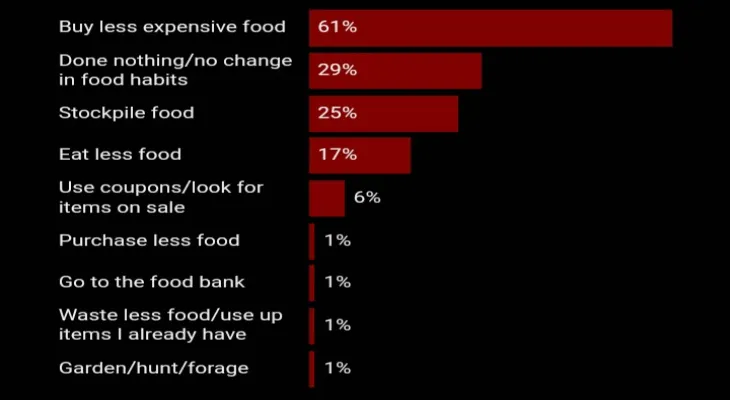Search here
Newspaper
Search here

Arab Canada News
News

Published: November 11, 2022
A new survey showed that Canadians are buying cheaper food, stocking up on food, and eating less in response to food prices amid rising inflation.
The survey, conducted by Nanos Research on behalf of CTV News, asked more than 1,000 Canadians whether their households had used a cost-saving option in the past month in response to food prices. The most common answer was buying cheaper food, with six out of ten Canadians saying they did so in the past thirty days.
But another quarter said they stockpiled food that month, and 17 percent of surveyed Canadians said they eat less food due to food prices. Six percent of respondents also said they actively use coupons or look for items on sale. The remaining four options were chosen by one percent of participants: buying smaller quantities of food, going to a food bank, using items they already have, or gardening and foraging for food.
Also, when responses were broken down between men and women, women were more likely to change their food purchasing behavior than men. About 34 percent of men said they hadn’t changed anything about their eating habits, compared to 23 percent of women. Similarly, 64 percent of women said they are buying cheaper foods compared to about 57 percent of men who said the same.
However, when the question was not related to buying food, the responses from men and women were similar, with 23 percent of men saying they stocked up on food compared to 26 percent of women, and 17 percent of both men and women said they ate less food in the past thirty days.
Likewise, younger Canadians were also more likely than older Canadians to change their behavior in the last 30 days due to food prices. More than 70 percent of those aged 18 to 34 said they buy cheaper food, compared to 65 percent of those aged 35 to 54 and about 51 percent of those over 55.
The same trend appeared in reverse when participants were asked if they had done nothing to change their food purchasing habits, with only 20 percent of those aged 18 to 34 choosing this option compared to 24.7 percent of those 35 to 54 years old and 37 percent of those over 55 years old.
Only 13 percent of adults aged 55 and over reported eating less food in the last 30 days in response to food prices, compared to 18.5 percent of those 35 to 54 and 21 percent of those aged 18 to 34.
By location, there was a 4 percent difference between the highest and lowest responses for buying cheaper food, with 62 percent of participants from Ontario and the Atlantic provinces choosing this option compared to 58 percent of participants from Quebec.
Quebec also had one of the highest percentages of participants who said they had not changed their eating habits, with about 31 percent choosing this option.
Across all areas, respondents from Quebec were less likely than those from other regions to report using various cost-saving options, with 11.5 percent stating they currently eat less to save money. The only exception was food stocking, where the highest percentage of respondents came from Quebec, at 33 percent. British Columbia had the highest percentage of people who said they had not changed any of their eating habits, about 32 percent.
This study indicates that the Atlantic provinces may be the most affected by inflation in terms of food prices, with a larger number of participants from these regions using these cost-saving options more than other areas.
Additionally, the highest percentage of respondents who said they eat less came from the Maritimes, with more than one in five participants from this region choosing this option. About 29 percent of respondents from the Atlantic territories said they stockpile food, ranking second after Quebec. The Atlantic provinces also had the lowest percentage of people who did not change any of their food purchasing habits, only 21 percent.
Comments